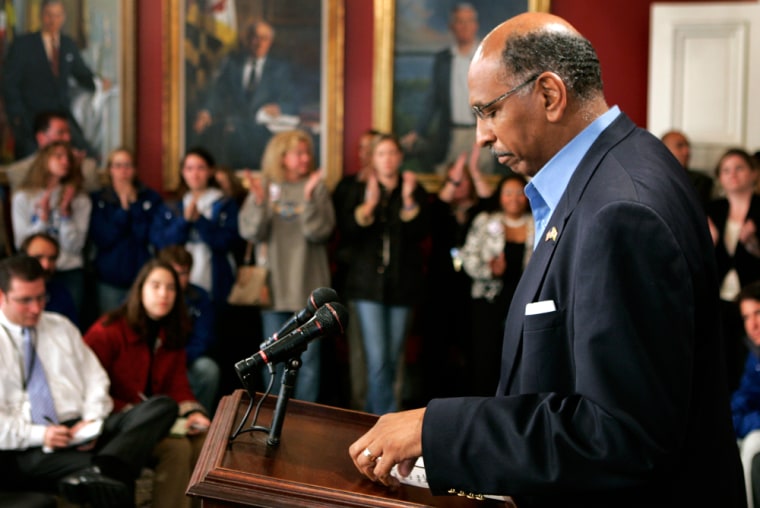Memo to Republican chief Ken Mehlman regarding recruiting black candidates: Try again.
Republicans had hoped to brand 2006 as the year of the black Republican. But with high-profile failures in Maryland’s Senate race and in governor contests in Ohio and Pennsylvania, prospects for GOP gains among black voters turned up short this year and gave scant hope for 2008.
Michael Steele, Maryland’s lieutenant governor, lost by almost 10 percentage points to Rep. Ben Cardin. Ken Blackwell, a conservative darling who would have been Ohio’s first black governor, lost by almost 24 percentage points; Lynn Swann lost his bid for the Pennsylvania governor’s office by 21 percentage points.
The three black Republicans were touted as a new front for the party, a position the GOP didn’t shy from Wednesday.
“History will show, these candidates represent a new breed of Republican leaders,” said Tara Wall of the Republican National Committee. “This is just the beginning.”
Wall insisted that Tuesday’s performance wouldn’t hinder Republican efforts to recruit candidates for future races. The RNC scheduled more than 100 outreach events to mobilize black voters, with more anticipated during the 2008 cycle, which began Wednesday.
Color may not be enough
“So what, if they don’t win?” asked Ron Walters, a former campaign official with Jesse Jackson and now a professor of government and politics at the University of Maryland. “If they can’t attract the black vote, it won’t pay off.”
He said Republicans would have to work to identify candidates based on issues, not simply on skin color.
“It’s not a question about putting up candidates. They have to have positions that are in line with the black community,” Walters said.
Exit polls showed 88 percent of blacks supported Democrats, about the same level of support as in the last few elections. More than half were dissatisfied and just over a third were angry with the Bush administration. The number of blacks who said they were angry was a bit higher than the general population, but the number dissatisfied was substantially higher.
“The RNC kept talking about them like they were their candidates,” said David Bositis of the Joint Center for Political and Economic Studies. “Both of them (Swann and Steele) got the nomination because the Republicans didn’t have anyone else.”
‘They were desperate this year’
Meanwhile, black GOP candidates were running in only eight House races, the lowest number since 1990. Democrats fielded 41 black candidates.
“I don’t think there was ever anything there,” Bositis said. “It was Ken Mehlman saying, breathlessly, we’re doing all these things. .... If you’re desperate, you can take whatever you think might work. They were desperate this year.”
Sen. Barack Obama, the Senate’s only black member and a potential 2008 presidential candidate, mocked the GOP effort last week.
“Listen, I think it’s great that the Republican Party has discovered black people,” Obama told a crowd at predominantly black Bowie State University. “But here’s the thing. ... You don’t vote for somebody because of what they look like. You vote for somebody because of what they stand for.”
Latent apologies
Mehlman last year apologized for his party’s “Southern strategy,” aimed at exploiting voters’ frustration with desegregation orders and later evolved to appeal to cultural issues.
“Some Republicans gave up on winning the African-American vote, looking the other way or trying to benefit politically from racial polarization,” Mehlman said at the NAACP convention. “I come here as Republican chairman to tell you we were wrong.”
President Bush followed up this summer at the convention, making his first appearance there after skipping for five years.
“I understand that racism still lingers in America,” Bush said. “It’s a lot easier to change a law than to change a human heart. And I understand that many African-Americans distrust my political party.”
That line generated boisterous applause and cheers from the audience.
